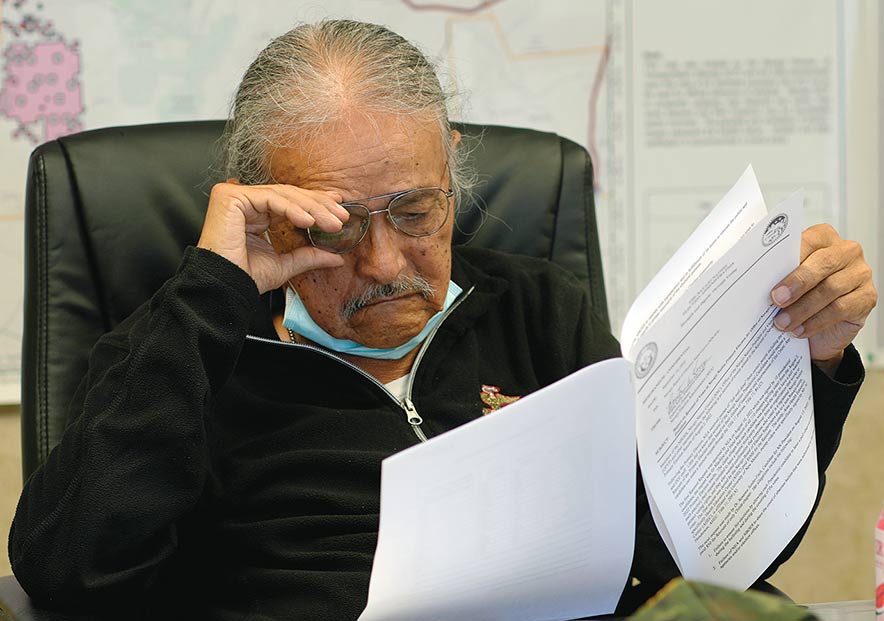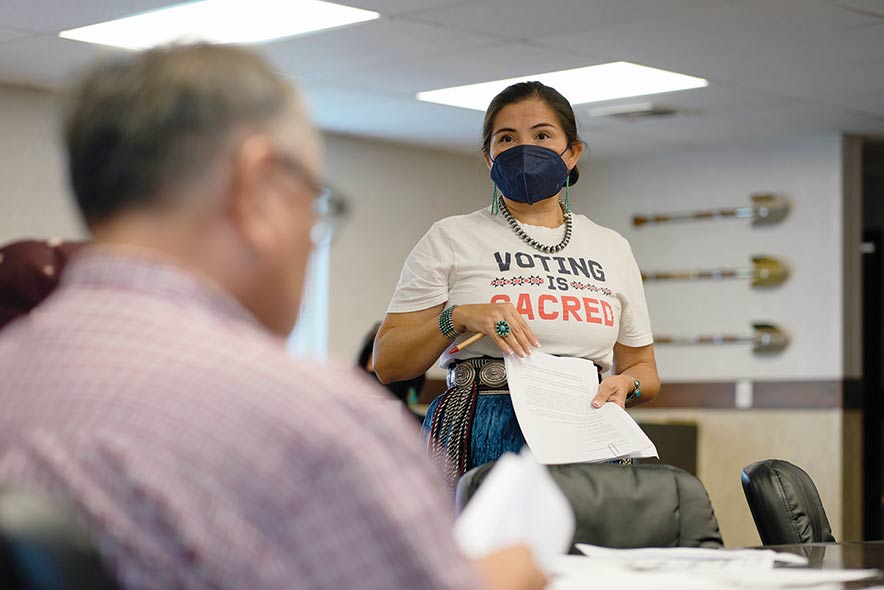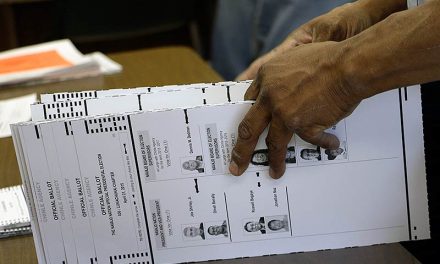
General election nears as former candidates continue applying pressure

Navajo Times | Donovan Quintero
Navajo Board of Election Supervisor member Young Jeff Tom reads a document on Sept. 22 in Window Rock.
WINDOW ROCK
The Nov. 8 tribal elections are still on schedule.
That doesn’t mean a grievance filed on Monday by former presidential candidate Ethel Branch, along with Rosanna Jumbo-Fitch and Emily Ellison, revealed how imperfect the tribal election process is – or the possibility of Frankie Davis filing another appeal with the Navajo Nation Supreme Court to reconsider her grievance – could still halt the general election, which is 33 days away.
Branch listed 36 tribal election code violations in her grievance, contending the Navajo Board of Election Supervisors, the Navajo Election Administration, and poll officials and possibly infringing on voter rights.
Navajo Board of Election Supervisors Vice Chair Raymond Maxx said Tuesday he is aware of Branch’s grievance. He said the election administration and its board are aware of the discrepancies found by the former candidates and have been working on purchasing new ballot boxes and increasing stipends for poll workers.
Maxx said one of the options they’re considering is writing emergency legislation.
“Another option we are looking at is the fiscal year carryover fund of $1.6 million from the Council,” he said. “The carryover is supposed to cover primary and general elections. We want to see if we can use it to cover costs.”
Maxx said that with the certification of the primary votes, which would violate Navajo Nation election laws if they did not certify them, they did not have much time to find funding for new ballot boxes and poll worker stipends.
Voting problems surface
On Monday, Branch filed her grievance with affidavits with the Office of Hearings and Appeals. Included in her complaint is an affidavit from Hector Begaye, a registered voter who votes at the Jeddito Chapter, and Harold Skow, who votes at the Mexican Water Chapter.
Begaye, an inspector for Navajo County for Arizona state primary elections on Aug. 2, wrote in his statement that he witnessed Jeddito Chapter voters not being able to vote because the tribal election poll site was “not yet staffed or open.”
“The Navajo Nation Chief Poll Judge for the Jeddito Chapter Polling Site arrived at approximately 8:30 a.m. MDT,” Begaye wrote in his affidavit.
Begaye wrote that the tribal poll judge began manually accepting ballots around 9 a.m. when the poll judge could not turn on the voting machine for “live ballot counting.” With the voting machine off, voters waited for up to 30 minutes as tribal poll officials manually accepted their ballots.
Maxx said Navajo voters wouldn’t have a choice in what machine they’ll place their ballots into once they vote because the same machines used in the Aug. 2 election would be used again in the upcoming tribal election.
Begaye continued in his affidavit that a Navajo Election Administration official arrived around 10:30 a.m. with a key to turn on the voting machine.
Begaye wrote curbside voting was provided as well.
For Skow, he said he and his wife attempted to vote early on July 25, which was on a Monday, according to a written testimony submitted with Branch’s grievance.
Skow wrote that it was closed when they arrived at the Fort Defiance Agency sub-office. He added they did not notice any sign indicating why the office was closed, nor were there any instructions that provided a different polling site voters could go to vote early.
“The next day, my wife and I were diagnosed with COVID and was placed into isolation for 10 days. My wife and I did not get to vote in the Navajo Nation 2022 Primary Election,” he wrote.
Internal inconsistencies
Along with her grievance, Branch attached a seven-page document with the names of 214 Navajo voters. And a one-page letter identifying the number of discrepancies, such as the failure to open or count 44 early and absentee ballots for Becenti Chapter, which they cite represent 13% of the chapter’s voting population.
The letter suggested election officials failed to open or count 36 early and absentee ballots from the Chilchinbeto Chapter.
Branch’s grievance went on to assert a recount, held from Sept. 29 to Oct. 2, revealed more than 100 missing ballots from the Teesto Chapter and found irregularities in more than half of the 110-chapter Aug. 2 vote tallies.
“This is unsurprising given that the Navajo Nation’s voting machines are at least 26 years old, and possibly over three decades old,” Branch’s grievance read.
Jumbo-Fitch said she was 2 years old when one of the voting machines was built. She said during the recount, she saw the voting machine stamped with 1988.
Jumbo-Fitch said she isn’t sure if the voting machine was built in 1988, but seeing the year stamped on it makes her question the age of the machines.
“I was 2 years old when the machines were bought,” she said, emphasizing she was not certain what 1988 on the voting machine indicated. “I tell my chapter that the Nation is 30 years behind.”
Maxx said purchasing new voting machines was lengthy, and the old voting machines would again be powered up and used on Nov. 8. But he did seem too concerned about the predicament.
“The old voting machines are 99.2 % accurate. They are old, and they do jam up,” Maxx said.
Registration is key

Navajo Times | Donovan Quintero
Former Navajo Nation Presidential candidate Ethel Branch speaks to Navajo Board of Election Supervisor vice chair Raymond Maxx on Sept. 22.
Registration to vote in the Nov. 8 general election ended on Sept. 30. Maxx said he did not know how many Navajo voters are officially registered and would have to consult with voter registration specialists to get an official number.
Navajo Nation Presidential hopeful Buu Nygren said he would “clean house internally” if elected. Nygren was asked what he would do as president to ensure Navajo voters were not discounted because they did not have a physical address.
“We have to revamp our own voting system,” Nygren said. “We have to revamp our own policies and procedures so that our people can vote because right now, we are the worst in the country because we suppress our people worse than the states do.
“We make it so tough and hard for our people to register to vote,” he said. “We ask them to come all the way home, we ask them for hard copies, we ask them for so much documentation. We make it difficult on our own people.”
He said if the legislation would improve voter participation and get better voting machines, he would not veto it.
“Voter suppression shouldn’t be happening here in the first place,” he said.
Absentee ballots and absentee walk-in voting at the Navajo Election Administration in Window Rock become available on Oct. 10. Last day for absentee walk-in ends on Nov. 4, and the general election will be on Nov. 8.








 Highway 264,
Highway 264, I-40, WB @ Winslow
I-40, WB @ Winslow